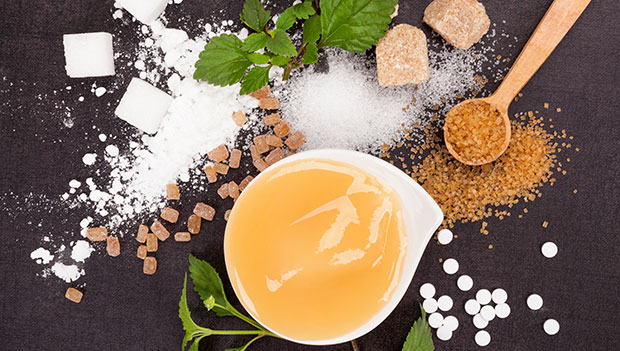
The 2020-2025 Dietary Guidelines for Americans recommend limiting added sugars from foods and beverages to less than 10 percent of your daily calories. In the United States, the biggest sources of added sugars are sugar-sweetened drinks such as sodas and sports drinks, desserts, coffees and teas, and candy. Though we’re supposed to be limiting added sugars in our diets, the typical American continues to add an average of almost 270 calories per day to their diet per the Dietary Guidelines.
To lower their intake of added sugars, people often turn to products sweetened with artificial sweeteners instead of sugar from table sugar, corn sugar derivatives, or syrups. Artificial sweeteners are sometimes referred to as non-nutritive sweeteners or sugar substitutes because they contain minimal calories. They often appear in products such as pre-workout supplements, sugar-free sodas and beverages, protein supplements, products designed for weight loss, and lower-sugar yogurts.
Though artificial sweeteners are included in countless products in our modern food system, consumers often wonder if they’re safe or bad for health. Read on to learn more about how artificial sweeteners work, the types of artificial sweeteners approved in the United States, and their potential benefits and downsides.
Products Sweetened With Artificial Sweeteners for Active People
- Transparent Labs: 100% Grass-Fed Whey Protein Isolate Powder
- Gainful: Pre-Workout With Stevia
- Ritual: Essential Protein Daily Shake
- Kaged: Branch-Chained Amino Acids
What Are Artificial Sweeteners?
Artificial sweeteners are also known as high-intensity sweeteners, low-calorie sweeteners, non-nutritive sweeteners, and sugar substitutes. They are used instead of sugar to sweeten foods and beverages.
There are six types of artificial sweeteners that are approved as food additives by the United States Food and Drug Administration (FDA):
- Saccharin
- Aspartame
- Acesulfame potassium
- Sucralose
- Neotame
- Advantame
In addition to the above six sweeteners, two sweeteners are Generally Recognized as Safe (GRAS), which means that a substance is generally recognized as safe by qualified experts "under the conditions of its intended use."
These sweeteners are:
- Stevia
- Monk Fruit extract
Common brand names of artificial sweeteners include Splenda, Sweet and Low, Equal, Truvia, and Nutrasweet.
How Do Artificial Sweeteners Work?
Natural sugar-containing sweeteners include sucrose (table sugar), fruit juice concentrates, molasses, maple syrup, agave nectar, and honey. In contrast, artificial sweeteners are derived from processing other sources. For example, saccharin and sucralose are made from sugar, while aspartame and neotame are made from chemical reactions with amino acids.
Artificial sweeteners are often sweeter than table sugar. According to Harvard Health, artificial sweeteners are 200-20,000 times sweeter than table sugars. For that reason, they’re used only in tiny amounts, thus reducing the added sugars and calories in products that were previously much higher in added sugars.
To find out if a product contains an artificial sweetener, read the Nutrition Facts label on the package carefully.
The Benefits of Artificial Sweeteners
Many studies on the benefits of artificial sweeteners have had mixed results. A 2012 joint statement between the American Heart Association and American Diabetes Association noted that sweeteners “could facilitate reductions in added sugars intake, resulting in decreased total energy and weight loss/weight control, and promoting beneficial effects on related metabolic parameters.”
In other words, artificial sweeteners have the following potential benefits:
- Reduce calories in foods and beverages
- Reduce the total amount of sugar in a product
- May aid in weight loss
- May help you maintain your weight
- Don’t raise blood sugar levels as much as standard sugars, which is useful for people with diabetes who sometimes need to limit their sugar intake to control their blood sugar closely
- Used in much smaller amounts than sugar since they’re as much as 20,000 times sweeter
Are Artificial Sweeteners Bad for You?
The artificial sweeteners approved by the FDA as food additives have been extensively studied. When artificial sweeteners are used in amounts approved by the FDA, they are safe.
Some early studies on lab animals showed some risk of cancer with artificial sweeteners. There isn’t evidence of an association with cancer for any of the FDA-approved sweeteners in human studies.
However, if you’re trying to eat a more natural, whole foods-based diet, artificial sweeteners may not fit as well into your food plan. Instead of substituting sugary drinks and foods with artificial sweeteners, you could try just eliminating foods high in sugars, like desserts, sodas, fruit juices, and candy.
Other Concerns With Artificial Sweeteners
For people who carefully monitor the types of foods and ingredients they consume, artificial sweeteners and sugar substitutes remain controversial. Reasons that some people prefer not to use them include the following:
- They are highly processed food additives
- They may not satisfy a sugar craving or may increase sugar cravings since your taste buds and brain sense a sweet taste, but you don’t actually consume a matching amount of real sugar
- They may increase inflammation, though more research is needed on this
- They may trigger headaches and migraines in some people who are prone to them
- There are some fears about their possible associations with cancer based on animal studies, though human studies indicate that they are safe for use in humans.
Of note, people who have phenylketonuria (PKU) should not consume aspartame. Aspartame contains phenylalanine, which their bodies cannot break down. PKU is diagnosed at birth and is a rare condition, so this is not a concern for most people.
FAQs About Artificial Sweeteners
What are the dangers of artificial sweeteners?
Artificial sweeteners are approved as food additives and/or generally recognized as safe by the FDA. Research is mixed on their effectiveness, but the safety of the six approved sweeteners has been extensively studied. Even so, there’s some evidence that they can trigger migraines or headaches in some people, possibly increasing inflammation. In addition, the artificial sweetener aspartame is dangerous for people with PKU. However, PKU is a rare genetic disease and is typically diagnosed at birth with a newborn screen.
Are artificial sweeteners worse for you than sugar?
It depends on your goals and how much you use. According to the FDA, artificial sweeteners are safe to use up to the approved amounts, much higher than a typical person could consume in a typical day. Research is mixed on their effects on weight control, blood sugar control, and calorie reduction. If you’re trying to eat a more whole foods-based diet with fewer processed foods, you will achieve greater health benefits by lowering your sugar intake without replacing sugary foods and drinks with similar foods made with artificial sweeteners.
What is the safest artificial sweetener to use?
According to the FDA, all six artificial sweeteners currently approved as food additives have been extensively studied for safety. For example, aspartame has been approved since 1981, and more than 100 studies support its safety. Brand names for aspartame include Nutra-Sweet and Equal. Sucralose (brand name: Splenda) has been approved by the FDA since 1998, and the FDA reviewed more than 110 safety studies before it was approved. If you’re interested in using more natural artificial sweeteners or sugar substitutes, stevia and monk fruit extracts are recognized as safe by the FDA, too. They are more closely derived from plants than other artificial sweeteners.
These statements have not been evaluated by the Food and Drug Administration. This product is not intended to diagnose, treat, cure, or prevent any disease.


